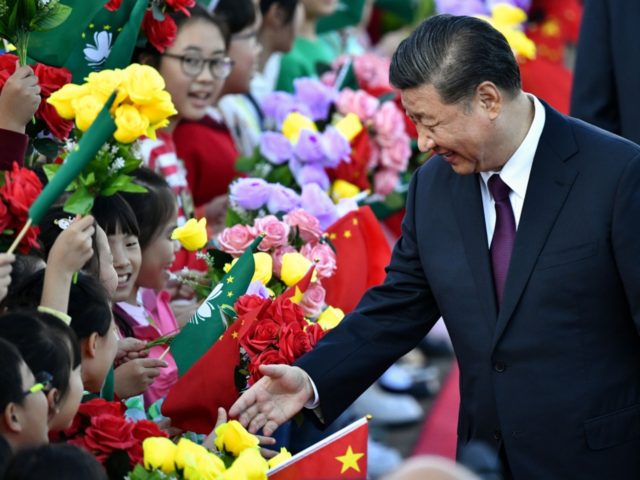Chinese dictator Xi Jinping landed in Macau, a nominally autonomous city south of China, on Wednesday to celebrate the anniversary of Beijing repossessing the former Portuguese colony.
Macau forms part of the same “Bay Area” as Hong Kong and features the same “one country, two systems” government in which the city cannot claim sovereignty and China cannot impose communist laws on it. The region’s capitalist economy has turned it into the premier world destination for luxury casinos and gambling, which generate millions for the Communist Party.
Unlike Hong Kong, Macau is significantly smaller and has a less sturdy democratic tradition. While reports this year have indicated some curiosity about the Hong Kong protests among the youth of Macau, the city has not experienced any significant demands for a democratic system. As such, Beijing has been using Macau in propaganda against the Hong Kong protests, hailing it as an exemplary adherent to the “one country, two systems” model.
Millions of Hong Kong residents have taken to the streets since June in opposition to a proposed law that would have allowed China to extradite anyone, regardless of citizenship status, into Chinese communist prisons, considered among the most violent in the world. Hong Kong’s Chinese-controlled government responded to the protests by violently suppressing them but ultimately did rescind the extradition bill. Protesters have continued to take the streets demanding an independent investigation into the police brutality used against them, as well as the right to directly elect lawmakers, freedom for imprisoned protesters, and an end to the government referring to them as “rioters.”
Xi Jinping, who has largely abstained from commenting on the protests in Hong Kong despite the protesters repeatedly naming him as a global threat to democracy, said he was “proud” of Macau for embracing the communist regime in remarks Wednesday.
“I am very happy to come to Macao again. In October, we held a grand celebration for the 70th anniversary of the founding of the People’s Republic of China. The 20th anniversary of Macao’s return to the motherland is another major event,” Xi said, according to the state news agency Xinhua. “It is worthwhile to sum up the experience and characteristics of Macao in faithfully implementing ‘one country, two systems.'”
The Global Times, a Chinese regime propaganda outlet, quoted a Macau politician as explicitly calling Xi’s visit on the anniversary of its incorporation into communist China a “reward” for not participating in the democratic protests seen in Hong Kong, even as some cities within communist China have done so. The newspaper also claimed “the festive mood was palpable across the city” in anticipation of Xi Jinping’s arrival and festivities Wednesday for the anniversary.
“Some local residents who spoke with the Global Times said they feel cheered up as the city is welcoming more new opportunities for future development,” the Global Times claimed, without actually naming any “local residents” saying this.
The Global Times also published an extensive article arguing that Macau’s education system heavily indoctrinates children in communist propaganda, and this has led to “big social and economic achievements” by minimizing the threat of youth thinking critically and demanding democratic governance. The article directly compares Macau to Hong Kong:
The riots in Hong Kong have been raging for about half a year, while Macao, which also develops under the framework of the “one country, two systems” principle, has been peaceful. What are the differences between the two special administrative regions under the same governing rule?
First, Hong Kong and Macao have gone through different histories. Hong Kong has been deeply affected by the West. When Portuguese were governing Macao, they failed to establish an integrated and sound governance system unlike what British people did in Hong Kong.
Second, Macao has seen stronger patriotism than Hong Kong. After its return, Macao has been maintaining close interaction with the mainland [China].
Another article applauded Macau’s education system for helping “uphold a strong sense of patriotism,” defined as loyalty to the Communist Party.
“Global Times reporters visited the city and found that Macao has had a long tradition of patriotic loyalty even before it returned to the motherland in 1999. Since 1999, the tradition has been well maintained and promoted at different levels of government, social communities and especially in education,” the article claimed. The reporters found that Macau elementary schools force children to memorize communist propaganda songs and “use Lego bricks to express their understandings of the China-proposed Belt and Road Initiative.” The BRI is a global infrastructure plan that would see China control the world’s most important transport hubs, roads, and seaways by indebting developing countries through predatory loans.
“Some of my friends from Hong Kong have misunderstandings of the ‘one country, two systems’ principle,” an anonymous high school student allegedly told the propaganda newspaper. “They received an education which is more pro-West than ours and may feel that the two systems are totally different and the regional government enjoys the same rights as that of the central government.”
Reports following months of protests in Hong Kong indicated that not all of Macau’s youth are properly represented by the profile in the Global Times.
“While Macau’s youth are not as politically engaged as their counterparts in Hong Kong, a small but increasingly vocal group of youngsters are seeing the protests as a stage to express their grievances and fight for a common cause,” the South China Morning Post in an investigation published in August. Youth in the city speaking to the newspaper said they feared challenging Beijing because it could result in their careers stymying or, more directly, losing their jobs. Legal trouble could also follow.
The Post found that those who feel oppressed by Macau’s government were much more likely to have visited Hong Kong and experienced life there, and lamented that Macau’s media and information sources largely censored news unfavorable to China.

COMMENTS
Please let us know if you're having issues with commenting.